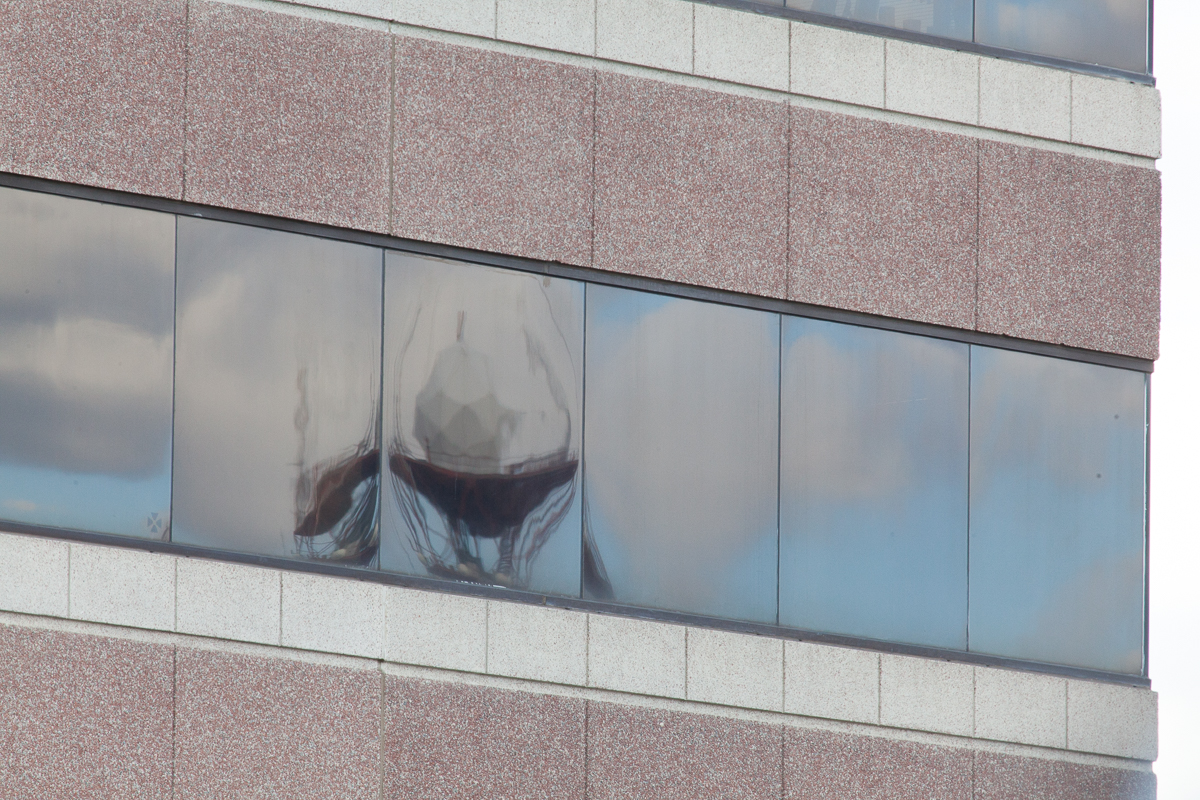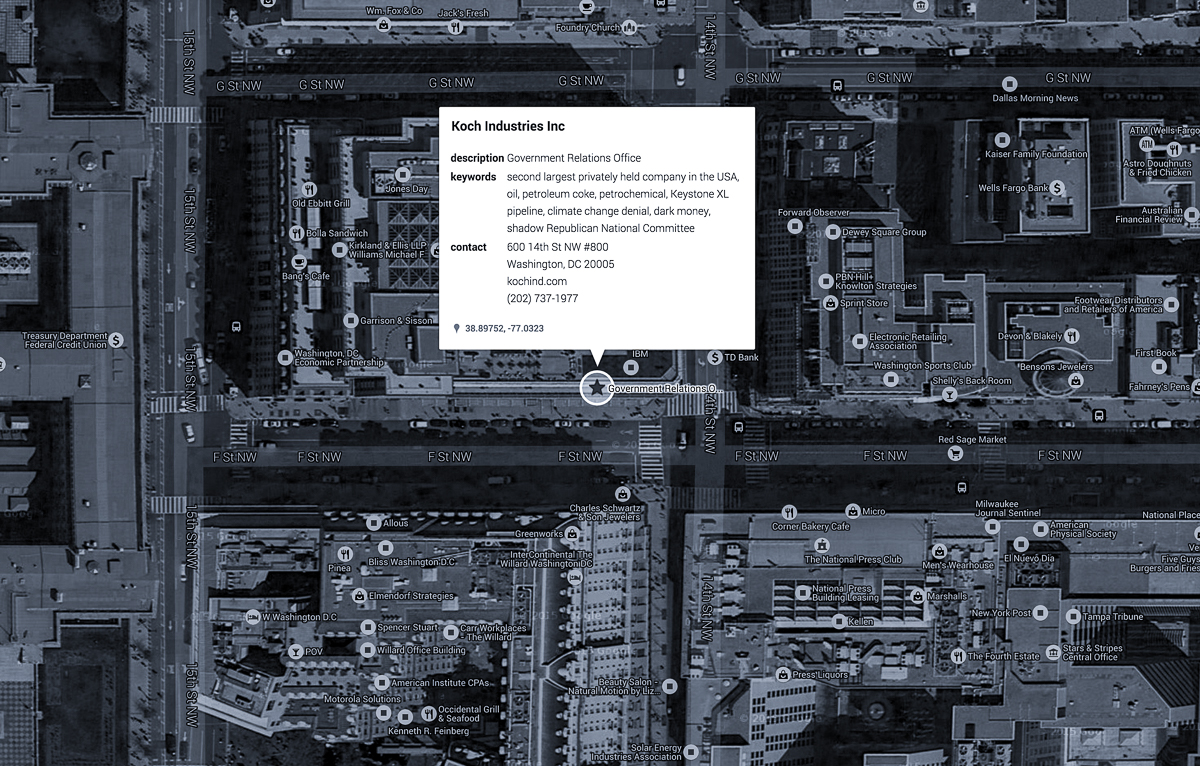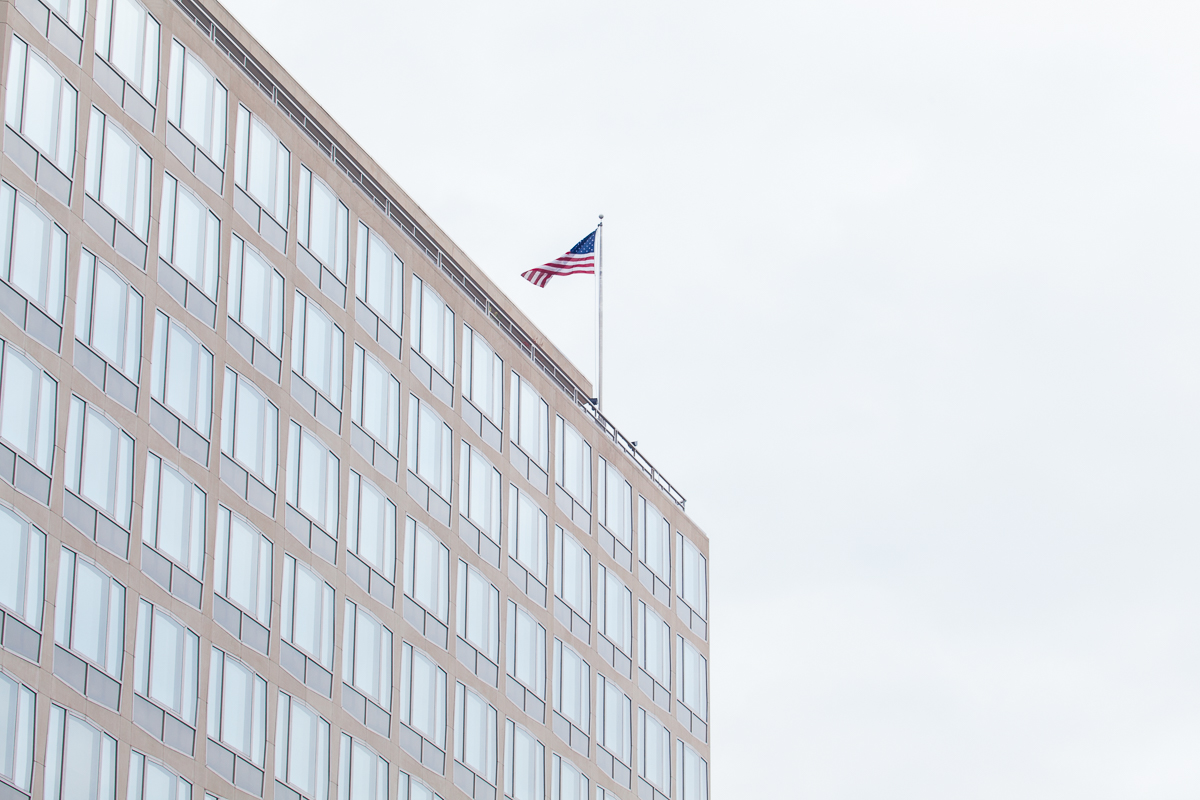Mirror, Window, Door: Aesthetics of the new avant-garde
Mirror, Window, Door: Aesthetics of the new avant-garde
This text is available in English only.
A phone rings in the dark. The recorded voice responds: “YOU’VE REACHED CITIZENS UNITED.” Like a diver emerging from the deep, the camera bobs up into the light, focusing with some difficulty on an unassuming brick facade. It’s as though your own eyes were blinking in disbelief. Am I seeing things? Can this really be the place where corporate finance took over the role of public speech?
What follows is not an answer to the question, but a litany of answering machines: the disembodied voices of lobbies, think tanks, trade associations, government relations offices, dark money disbursement funds and political action committees. Power brokers, secret planners, merchants of deceit, captured with hallucinatory precision in the form of blank windows armored against the street. Their distorted geometries slide angularly across the screen, identified each time by absent voices: “YOU’VE REACHED THE LOCKHEED-MARTIN FRONT DESK AT 300 M STREET, WASHINGTON, DC…” “YOU’VE REACHED THE OFFICES OF KOCH COMPANIES, PUBLIC SECTOR…” “THANK YOU FOR CALLING THE ATLAS SOCIETY: THE ULTIMATE HUB FOR THE ADVOCACY OF CAPITALISM AND RATIONAL SELF-INTEREST.” It’s all so weirdly transparent, so densely opaque, so concretely banal; but even the camera seems to tremble. Or was that just me, the citizen of a former democracy, trembling at the sights where agency was lost?
Steve Rowell is an artist, an investigator, a citizen-spy with a rented car, a tripod and a telephoto lens. Using lush HD video that distills the qualities of both still photography and dramatic cinema, he has created a hypnotic visual spectacle that probes the hidden nerves of American governance. Punctuated by monumental Washington cityscapes and the haunting electronic music of Popul Vuh, his latest piece of video art is an analytical tool and an aesthetic sensation, timed for release into the national bloodstream at the fever pitch of an election year. Behind the TV debates and the ugly attack ads it exposes a frozen logic of political control. Yet simultaneously the movement of this work gets under your skin, troubling your imagination, releasing unexpected energies and potentials. It delivers a double message on parallel tracks, like the flat beat of a metronome that becomes an organic pulse in the body. This double message—the real parallelogram—is what I want to investigate here. It may hold a vital clue about what art can accomplish within the fractalized circuitry of today’s power structures.
Rowell’s work is fascinating, but it’s definitely not easy. It makes rigorous demands of anyone who feels concerned by what political scientist Sheldon Wolin calls “managed democracy.”1 By ticking off a shortlist of quasi-governmental agencies, it sketches out the expanding field of dark money in American politics. A projected graphic locates each facade on the street map of Washington, identifying an institutional category and offering a few conceptual clues. Any further understanding or action will be up to you. Once captured by the spell, you have to make the decision: is this artwork going to be a mirror, a window or a door?

© 2015 Steven Rowell – AT&T Government Solutions, Government Relations Office
full captions below
Follow the hyperlinks of specialized websites like sourcewatch.org, which Rowell has used extensively in his work, and three connected tableaus will gradually emerge. The first is the “money maze” of disguised campaign contributions funneled to high-stakes media outlets by so-called Super PACs, or quasi-autonomous political action committees. Their openly partisan attack ads were legitimated by the Supreme Court decision of Citizens United v. Federal Election Commission on January 21, 2010. That’s when corporate finance gained the rights of free and unaffiliated political speech. Super PACs can now effectively unite with strategic communications firms and campaign managers at a single address like 66 Canal Center Plaza. Rowell points very deliberately to that address in the video, where calls to two nominally separate entities yield the same individual’s voice on the answering machine. Search a little further on the net and you'll discover the role this location played during the 2012 presidential campaign.2 When you follow such clues, the light changes. The mirrored facade becomes a window, and slowly you begin to see what’s inside.
But Rowell wants us to look much further. Washington is home to a bewildering array of professional lobbies, think tanks and government relations offices that transform theoretical concepts and scientific discoveries into slogans for the public and policy packages for the bureaucrats. These entities account for the majority of stops on his itinerary. They range from the mock sublime (the Atlas Society promoting the dramatized ideology of Ayn Rand) to the patently ridiculous (the Sugar Association railing against a WHO guideline that your diet contain only 10 percent candy). But most of them are deadly serious: the Cato Institute, the National Security Network, the Financial Roundtable, Goldman Sachs, Google, Raytheon, Booz Allen Hamilton. These are the special interest groups that furnish the government’s expertise, and in many cases actually draft the legislation that gets passed in Washington. Open their windows, and the effective diagrams of imperial power come into view.
A third group of Washington entities has just one example in the video: the Institute of World Politics. It’s a graduate school offering degrees in statecraft, international affairs, strategic intelligence and national security. It’s clear why this institution was selected for Parallelograms: it’s inside the Beltway, it’s heavily staffed by former government officials and it focuses on foreign relations where ordinary citizens have the least influence. But in my view, it’s crucial to the whole project that at least one university be included. Only then can you grasp the whole picture.
Any sustained navigation through the clouds of concepts billowing up from this video will bring you to a short article entitled “The Structure of Social Change.”3 It’s by a guy named Rich Fink (what better name?). He believes that political behavior in a democracy is produced just as consumption items are, through the collaboration of three kinds of enterprise: primary industries, secondary manufacturers and retailers delivering the finished goods. To influence political behavior, you invest in the heavy intellectual industry of universities, the intermediate manufacturing and packaging activities of think tanks and trade associations, and the retail delivery mechanisms of lobbies, public relations groups and media communications firms. Now we can see the larger structure. Rich Fink has been an associate of Charles Koch since the late 1970s and an officer or board member of almost all the Koch entities, including the massively endowed Charles G. Koch Charitable Fund, which supports dozens of politically active organizations. Rich Fink has been extremely well placed to practice what he theorizes.

© 2015 Steven Rowell – Koch Industries Inc, Government Relations Office
full captions below
Yet the structure of social change retraced in Parallelograms is broader and more finally grained than any single detail can convey. What the work ultimately reveals, for whoever cares to see it, is the polyarchic matrix of institutional power that arose in American society after the emergence of the so-called “new social movements” of the late 1960s. This complex structure of power was a response to what the infamous Powell Memorandum of August 1971 called an “attack on the American free enterprise system.”4 The critique of the corporate state emerged from “the college campus, the pulpit, the media, the intellectual and literary journals,” where dissenting groups were increasingly able to see through the veils of imperial power. The right-wing answer to that challenge is what structures society today. It has developed along multiple yet increasingly convergent paths since the Reagan-Thatcher era, finally crystallizing into a globally hegemonic set of operating routines whose systemic corruption was revealed by the Bush wars in Iraq and Afghanistan and the financial crisis of 2008. What we are looking at in Parallelograms is a frozen logic, a vast answering machine. Its mechanisms are well in place, they function almost automatically—in Frankfurt and Brussels as well as in Washington. The question is whether any new social movement could ever stand up against this sophisticated system.
Listen again to the space-music compositions of Popul Vuh, from the 1971 album In den Gärten Pharaos (In the Gardens of the Pharaoh). Nothing could better convey the affects of fascination and disembodied horror that accompanied the installation of the mirror-phase of capitalism in the early 1970s, when social relations were twisted and reshaped by a great monetary and military crisis. For a generation and more, the aesthetics of the global labyrinth were defined by something quite close to the visual experience that Steve Rowell offers us here. The soaring glass facades of the Los Angeles Bonaventure Hotel analyzed by Fredric Jameson were the material signifiers of a profoundly schizophrenic postmodern world.5 On those gleaming facades, corporate power reflected only endless fragments of one’s own dissociated image, shot through with stimulating psychotic energies. Like Baroque interiors with their complex ellipses and perspectival trompe-l’oeil, the new cityscapes imposed a deep disorientation on populations without any access to the data banks and communications nets that alone could make them navigable. Across that long era we were taught the pleasures of delirious abandonment to complexity.
Today such delirious pleasure is still the primary aesthetic response to urban space, commanded by spectacular architecture and reinforced by ubiquitous access to black-boxed media networks. Yet now, a quarter of a century after the early knowledge-hacking experiments of groups like Critical Art Ensemble, the perspectives of cognitive mapping that Rowell evokes are very real. The visual analysis of Parallelograms is carried out with laser-like precision. It reminds me of the lucid infrastructure shots that lend such urgency to Laura Poitras’s recent film Citizenfour. But as that film shows so powerfully, the great monetary and military crisis which began unfolding in 2008 has brought something radically new onto the scene. Major hacking exploits and their politicized deployment in the global infosphere have become key influences redefining our sense of what an avant-garde can look like—and do—in the twenty-first century. The challenge for artists today is to link their aesthetics not only to analysis and knowledge, but also to decisive agency in the multiple and expanding cracks of an irremediably complex and mediated society. The challenge is to show you, as if in a mirror, the tangible possibility of what you alone can create. Which is not just a window but a door.

© 2015 Steven Rowell – Corn Refiners Association Inc, Trade Association
full captions below
Let’s put it this way. Citizen’s United is not a dark-money fund, but a producer of virulently partisan right-wing movies that function as feature-length attack ads. Citizens United is an aesthetic operation. Rowell opens his video by indicating exactly that kind of aesthetic production as symbolic of the adversary. And then he responds, but not with more of the same. Today, the aim of the vanguard artist is neither postmodern fragmentation, nor even less the corporate simulacrum of a united people. Instead the aim is to disperse and multiply an active and communicative citizen. Conditions being what they are, this is very often a citizen-spy who cuts through the arcana of corporate governance and moves directly to the threshold where knowledge becomes political power. The artist too takes on the persona of this invisible but highly communicative citizen-spy, opening the windows, probing behind the facades. Yet what he or she can add to the ethical precision of the hacker is a rhythmic sense of political potential, an embodied affective pulse. The capacity to move against desperation is the primary condition of change in a frozen social order.
“Superpower is the union of state and corporation in an age of waning democracy and political illiteracy,” writes Sheldon Wolin.6 Will it be any different in 2016? Four years ago, the billions of dollars pumped into Super PACs were in vain. Voters drew on a wide range of resources to identify and denounce the messages of the campaign-money oligarchy and refuse the most blatant forms of manipulation. That was accomplished by multiple forms of active intelligence dispersed throughout a complex society. Beyond the elections, the question is how to challenge the malignant structure of polyarchic power.
Parallelograms concludes with a poignant image of autumn leaves and a final disembodied voice. It’s the Competitive Enterprise Institute. Hardcore climate change deniers. There’s a lot left to hack in the twenty-first century.
Notes
1 Sheldon Wolin, Democracy Inc.: Managed Democracy and the Specter of Inverted Totalitarianism (Princeton University Press, 2008).
2 See the article “Fine Line Between ‘Super PACs’ and Campaigns,” New York Times, Feb. 25, 2012.
3 Rich Fink’s 1996 article is available at http://tinyurl.com/structure-of-social-change.
4 The memorandum can be accessed at http://reclaimdemocracy.org/powell_memo_lewis. For the critical concept of polyarchic power, see William I. Robinson, Promoting Polyarchy: Globalization, US Intervention, and Hegemony (Cambridge University Press, 1996).
5 See Fredric Jameson’s classic text, “Postmodernism, or The Cultural Logic of Late Capitalism,” in New Left Review 146, July-August 1984.
6 Sheldon Wolin, op. cit., p. 131.
www.steverowell.com
www.threecrises.org
www.sourcewatch.org
www.opensecrets.org
www.sunlightfoundation.com
To see the text as printed and distributed at transmediale, you can download the PDF here.
Image Captions:
All photographs copyright © 2015 Steven Rowell
Corn Refiners Association Inc, Trade Association
Corn syrup advocates, big agriculture, pro-genetically modified organisms
1701 Pennsylvania Ave NW # 950
Washington, DC 20006
corn.org, (202) 331-1634
Citizens United, Super PAC
Infamous Supreme Court decision: Citizens United v. Federal Election Commission, anti-campaign finance limits, anti-immigration, anti-United Nations, anti-ACLU
1006 Pennsylvania Ave SE
Washington, DC 20003
citizensunited.org, (202) 547-5420
still from synchronized map video showing exact coordinates and spatial condition of:
Koch Industries Inc, Government Relations Office
American International Group (AIG), Government Relations Office
Emergency Economic Stabilization Act of 2008 ($182.5 billion bailout), credit default swaps, mortgage meltdown,
901 K St NW #1050
Washington, DC 20001
aig.com, (202) 783-0486
American Legislative Exchange Council (ALEC), Trade Association
Powerful pro-corporate bill mill, legislation ghost writer, anti-immigration, prison profiteers, Animal Enterprise Terrorism Act (anti-activist)
101 Vermont Avenue NW, 11th floor
Washington, DC 20005
alec.org, (202) 4600-3800
AT&T Government Solutions, Government Relations Office
Defense and Intelligence communications sector, surveillance, National Security Agency, Central Intelligence Agency
1900 Gallows Rd
Vienna, VA 22182
corp.att.com, (703) 506-5000
Booz Allen Hamilton, Government Relations Office
Security consultancy, owned by The Carlyle Group, former employer of NSA whistleblower Edward Snowden
20 M St SE #1000
Washington, DC 20003
boozallen.com, (202) 203-3700
Brownstein Hyatt Farber Schreck, Lobbying Firm
Industries: oil & nuclear energy, corporate tax, and finance; ties to ALEC; revolving door lobbyists 62%
1350 I St NW #510
Washington, DC 20005
bhfs.com, (202) 296-7353
Cato Institute, Think Tank
Founded by Charles G. Koch and funded by the Koch brothers, free market, climate change denial
1000 Massachusetts Ave NW,
Washington, DC 20001
cato.org, (202) 842-0200
Competitive Enterprise Institute, Think Tank
Dedicated to free enterprise and limited government, tobacco industry funding, mountaintop removal (coal), climate change denial
1899 L St NW #12
Washington, DC 20036
cei.org, (202) 331-1010
American Crossroads, Super PAC
Karl Rove's Super PAC, shadow Republican National Committee, Sheldon Adelson, U.S. Chamber of Commerce, lampooned by Stephen Colbert
1401 New York Avenue, NW #1200
Washington, DC 20005
americancrossroads.org, (202) 559-6424
Financial Services Roundtable, Lobby
Federal treasury conduit; membership includes many bailed-out banks including: Citigroup, JPMorgan Chase, Bank of America, Wells Fargo, and PNC
1001 Pennsylvania Ave. NW #500
Washington, DC 20004
fsroundtable.org, (202) 289-4322
Goldman Sachs & Co, Government Relations Office
Banking deregulation, Wall Street meltdown, junk bonds, toxic assets
101 Constitution Ave NW
Washington, DC 20001
goldmansachs.com, (202) 637-3700
Koch Industries Inc, Government Relations Office
Second largest privately held company in the USA, oil, petroleum coke, petrochemical, Keystone XL pipeline, climate change denial, dark money, shadow Republican National Committee
600 14th St NW #800
Washington, DC 20005
kochind.com, (202) 737-1977
American Petroleum Institute, Trade Association
Represents 400 corporations engaged in oil production, extraction (including hydrofracking), and distribution; climate change denial, Keystone XL pipeline
1220 L St NW # 900
Washington, DC 20005
api.org, (202) 682-8000
National Rifle Association, Lobby
Leader of the pro-gun lobby, ALEC "Stand Your Ground" laws, anti-ACLU, anti-regulation propaganda
11250 Waples Mill Rd
Fairfax, VA 22030
nra.org, (989) 631-8555
National Security Network, Think Tank
“Progressive" international relations, global affairs and national security
1300 L Street, NW Suite 1150
Washington, DC 20005
nsnetwork.org, (202) 289-5999


















